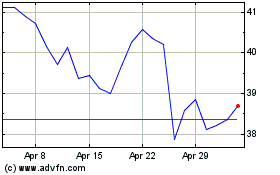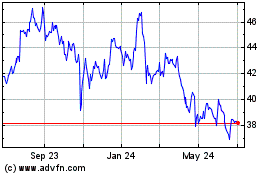Groupon Works to Win Back Investors
August 15 2016 - 8:30AM
Dow Jones News
Groupon Inc. is slowly winning back the kind of bargain hunter
it has sorely missed during the past three years: investors.
Months after newly appointed Chief Executive Rich Williams
lamented that Wall Street "misunderstood" the online discounter's
business model, Groupon's stock has rebounded. Its shares are up
nearly 90% this year and got a boost when its active users
surpassed 50 million globally in the recent quarter. Shares closed
at $5.73 on Friday in New York.
The Chicago company acts as a marketing outlet for restaurants,
beauty salons and other local businesses by selling discounted
services on their behalf. The company is projected to book revenue
of $3 billion this year, but until recently its market value was
half that. Rivals have struggled and Amazon.com Inc. last year shut
its Groupon competitor.
Groupon this year has gone on an offensive to try to recast the
company as one of the few online players able to succeed in local
markets. It also has owned its past mistakes and blames itself for
poorly communicating the company's story.
Mr. Williams, a former Amazon executive who has worked at
Groupon since before its 2011 IPO, says the company now has a more
straightforward game plan. It has retrenched globally, shedding
offices in 21 countries and cutting 2,000 jobs, or 20% of its
workforce. It is spending more money on customer service for the
U.S. market, which contributes two-thirds of its revenue.
"We've been simplifying the strategy and being consistent in
what we say," the 41-year-old CEO said in an interview. "How we
discuss the strategy internally is how we discuss the strategy
externally."
It also has succeeded in convincing some big investors to take
the risk. Chinese e-commerce giant Alibaba Group Holding Ltd.
revealed a 5.6% stake in February, when the company's stock was
near an all-time low. Atairos Management LP, an investment fund
launched by cable giant Comcast Corp., followed in April, buying
convertible bonds worth up to 7.5% of the company for $250 million.
At the time, Atairos said it hoped Comcast would work with Groupon
to expand its reach to more customers.
Ruth Ann Francis, a 41-year-old aerospace engineer from Fort
Worth, Texas, is the kind of sporadic customer Groupon would like
to get spending more. She said she uses about one or two deals a
year, usually for activities she wants do to anyway, like Segway
tours and minigolf. "This year I've used two already, so we're on
track to be a little higher," she said.
To attract new investors, Groupon has shifted its focus to
driving profitability from each deal it sells and avoiding "empty
calories" from deals such as electronics or high-end apparel sold
through its shopping site. The plan also rests on adding users more
quickly, even if doing so weighs on near-term results.
The company has posted losses in four straight quarters.
Marketing spending of $92 million in the latest quarter was at its
highest level since the first quarter of 2012, and a 61% increase
from a year ago. By comparison, revenue in the quarter rose just
2.4%.
"We obviously would love all this stuff to move faster, but
we're happy with the basics of how customer use is changing over
time," Mr. Williams said.
The company's cash position also is down. At the end of March,
Groupon had its lowest cash balance since it went public, with
$688.5 million in cash and equivalents. At the end of June, that
rose to $780 million, compared with the $1.1 billion on hand at the
same point last year. A Groupon spokesman said many of the expenses
that hit the company's cash flow earlier this year were
temporary.
Launched in 2008, Groupon once was considered among the
internet's hottest startups targeting local businesses, a
notoriously tough market for Web companies to pierce. It sported a
$16 billion market value shortly after its 2011 initial public
offering. Shareholders soured on the stock almost immediately as
losses ballooned and "deal fatigue" set in among its user base.
Changes to Gmail and other email programs made it more difficult
for Groupon's daily messages to get noticed, choking off a major
source of new business. The company also earned a reputation for
surprising the market with big losses, and its use of exotic
financial metrics that came under regulatory scrutiny.
Groupon plans to keep spending. It already has kicked off new TV
ads and is in talks with Comcast about expanding its marketing
campaign. Groupon also uses push notifications and ads on Google
and Facebook to remind users about restaurant deals and spa
promotions.
It appeared to be an also-ran, ready to join the ranks of
Myspace and Foursquare. In February, when its shares fell to an
all-time low, it was worth only $1.3 billion. That was a week
before Alibaba disclosed its investment.
Groupon faces a challenge convincing more skeptical customers
its discount offers are worthwhile. Macquarie analyst Tom White
said the service has made strides expanding its supply of local
businesses but has yet to reach its more ambitious audience goals.
"As far as driving that day-in, day-out usage, it's not going to be
easy," he said.
Write to Drew FitzGerald at andrew.fitzgerald@wsj.com
(END) Dow Jones Newswires
August 15, 2016 08:15 ET (12:15 GMT)
Copyright (c) 2016 Dow Jones & Company, Inc.
Comcast (NASDAQ:CMCSA)
Historical Stock Chart
From Mar 2024 to Apr 2024

Comcast (NASDAQ:CMCSA)
Historical Stock Chart
From Apr 2023 to Apr 2024
